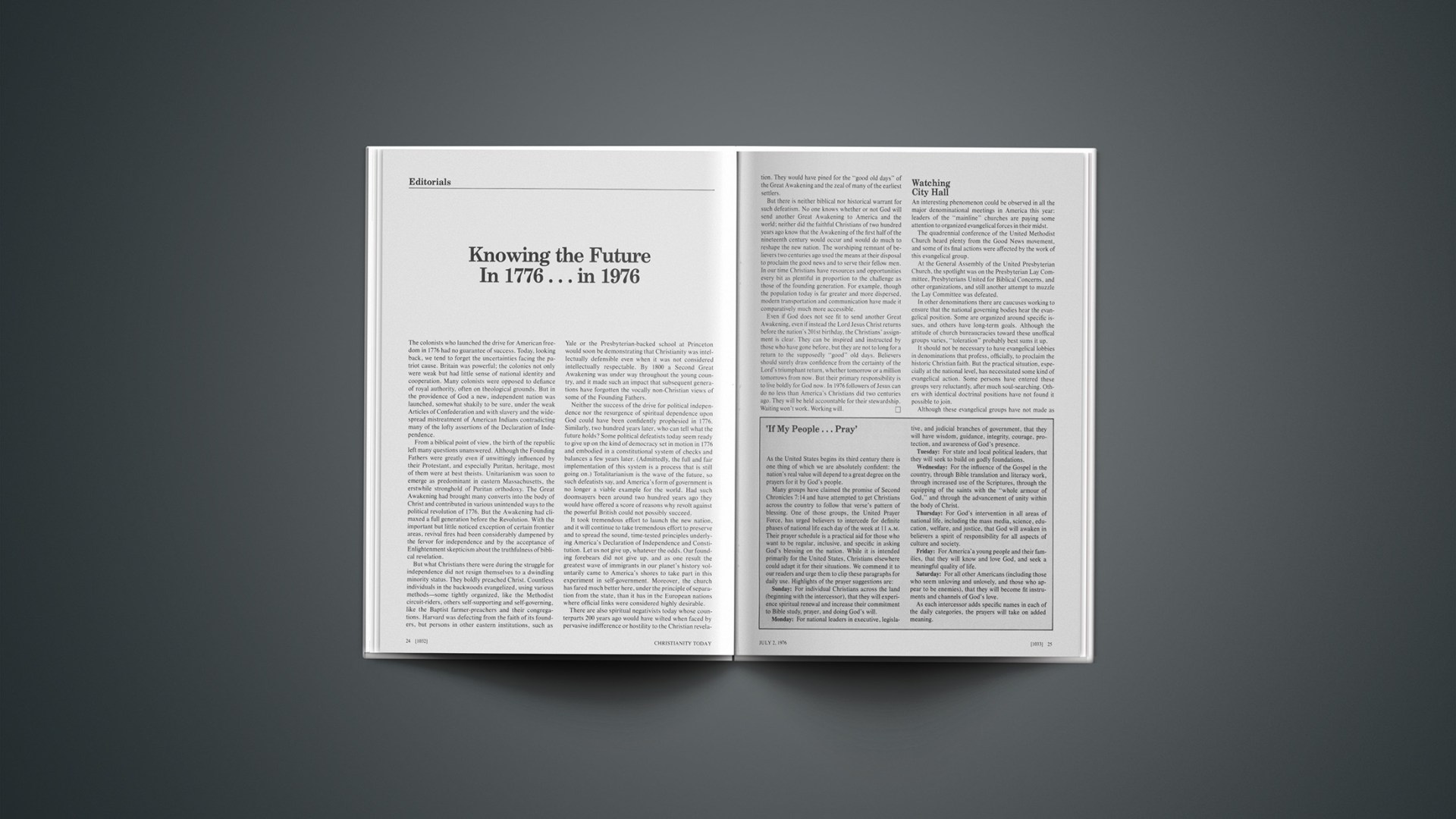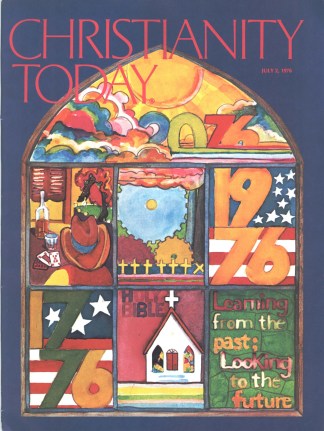The colonists who launched the drive for American freedom in 1776 had no guarantee of success. Today, looking back, we tend to forget the uncertainties facing the patriot cause. Britain was powerful; the colonies not only were weak but had little sense of national identity and cooperation. Many colonists were opposed to defiance of royal authority, often on theological grounds. But in the providence of God a new, independent nation was launched, somewhat shakily to be sure, under the weak Articles of Confederation and with slavery and the widespread mistreatment of American Indians contradicting many of the lofty assertions of the Declaration of Independence.
From a biblical point of view, the birth of the republic left many questions unanswered. Although the Founding Fathers were greatly even if unwittingly influenced by their Protestant, and especially Puritan, heritage, most of them were at best theists. Unitarianism was soon to emerge as predominant in eastern Massachusetts, the erstwhile stronghold of Puritan orthodoxy. The Great Awakening had brought many converts into the body of Christ and contributed in various unintended ways to the political revolution of 1776. But the Awakening had climaxed a full generation before the Revolution. With the important but little noticed exception of certain frontier areas, revival fires had been considerably dampened by the fervor for independence and by the acceptance of Enlightenment skepticism about the truthfulness of biblical revelation.
But what Christians there were during the struggle for independence did not resign themselves to a dwindling minority status. They boldly preached Christ. Countless individuals in the backwoods evangelized, using various methods—some tightly organized, like the Methodist circuit-riders, others self-supporting and self-governing, like the Baptist farmer-preachers and their congregations. Harvard was defecting from the faith of its founders, but persons in other eastern institutions, such as Yale or the Presbyterian-backed school at Princeton would soon be demonstrating that Christianity was intellectually defensible even when it was not considered intellectually respectable. By 1800 a Second Great Awakening was under way throughout the young country, and it made such an impact that subsequent generations have forgotten the vocally non-Christian views of some of the Founding Fathers.
Neither the success of the drive for political independence nor the resurgence of spiritual dependence upon God could have been confidently prophesied in 1776. Similarly, two hundred years later, who can tell what the future holds? Some political defeatists today seem ready to give up on the kind of democracy set in motion in 1776 and embodied in a constitutional system of checks and balances a few years later. (Admittedly, the full and fair implementation of this system is a process that is still going on.) Totalitarianism is the wave of the future, so such defeatists say, and America’s form of government is no longer a viable example for the world. Had such doomsayers been around two hundred years ago they would have offered a score of reasons why revolt against the powerful British could not possibly succeed.
It took tremendous effort to launch the new nation, and it will continue to take tremendous effort to preserve and to spread the sound, time-tested principles underlying America’s Declaration of Independence and Constitution. Let us not give up, whatever the odds. Ourfounding forebears did not give up, and as one result the greatest wave of immigrants in our planet’s history voluntarily came to America’s shores to take part in this experiment in self-government. Moreover, the church has fared much better here, under the principle of separation from the state, than it has in the European nations where official links were considered highly desirable.
There are also spiritual negativists today whose counterparts 200 years ago would have wilted when faced by pervasive indifference or hostility to the Christian revelation. They would have pined for the “good old days” of the Great Awakening and the zeal of many of the earliest settlers.
But there is neither biblical nor historical warrant for such defeatism. No one knows whether or not God will send another Great Awakening to America and the world; neither did the faithful Christians of two hundred years ago know that the Awakening of the first half of the nineteenth century would occur and would do much to reshape the new nation. The worshiping remnant of believers two centuries ago used the means at their disposal to proclaim the good news and to serve their fellow men. In our time Christians have resources and opportunities every bit as plentiful in proportion to the challenge as those of the founding generation. For example, though the population today is far greater and more dispersed, modern transportation and communication have made it comparatively much more accessible.
Even if God does not see fit to send another Great Awakening, even if instead the Lord Jesus Christ returns before the nation’s 201st birthday, the Christians’ assignment is clear. They can be inspired and instructed by those who have gone before, but they are not to long for a return to the supposedly “good” old days. Believers should surely draw confidence from the certainty of the Lord’s triumphant return, whether tomorrow or a million tomorrows from now. But their primary responsibility is to live boldly for God now. In 1976 followers of Jesus can do no less than America’s Christians did two centuries ago. They will be held accountable for their stewardship. Waiting won’t work. Working will.
‘If My People … Pray’
As the United States begins its third century there is one thing of which we are absolutely confident: the nation’s real value will depend to a great degree on the prayers for it by God’s people.
Many groups have claimed the promise of Second Chronicles 7:14 and have attempted to get Christians across the country to follow that verse’s pattern of blessing. One of those groups, the United Prayer Force, has urged believers to intercede for definite phases of national life each day of the week at 11 A.M. Their prayer schedule is a practical aid for those who want to be regular, inclusive, and specific in asking God’s blessing on the nation. While it is intended primarily for the United States, Christians elsewhere could adapt it for their situations. We commend it to our readers and urge them to clip these paragraphs for daily use. Highlights of the prayer suggestions are:
Sunday: For individual Christians across the land (beginning with the intercessor), that they will experience spiritual renewal and increase their commitment to Bible study, prayer, and doing God’s will.
Monday: For national leaders in executive, legislative, and judicial branches of government, that they will have wisdom, guidance, integrity, courage, protection, and awareness of God’s presence.
Tuesday: For state and local political leaders, that they will seek to build on godly foundations.
Wednesday: For the influence of the Gospel in the country, through Bible translation and literacy work, through increased use of the Scriptures, through the equipping of the saints with the “whole armour of God,” and through the advancement of unity within the body of Christ.
Thursday: For God’s intervention in all areas of national life, including the mass media, science, education, welfare, and justice, that God will awaken in believers a spirit of responsibility for all aspects of culture and society.
Friday: For America’a young people and their families, that they will know and love God, and seek a meaningful quality of life.
Saturday: For all other Americans (including those who seem unloving and unlovely, and those who appear to be enemies), that they will become fit instruments and channels of God’s love.
As each intercessor adds specific names in each of the daily categories, the prayers will take on added meaning.
Watching City Hall
An interesting phenomenon could be observed in all the major denominational meetings in America this year: leaders of the “mainline” churches are paying some attention to organized evangelical forces in their midst.
The quadrennial conference of the United Methodist Church heard plenty from the Good News movement, and some of its final actions were affected by the work of this evangelical group.
At the General Assembly of the United Presbyterian Church, the spotlight was on the Presbyterian Lay Committee, Presbyterians United for Biblical Concerns, and other organizations, and still another attempt to muzzle the Lay Committee was defeated.
In other denominations there are caucuses working to ensure that the national governing bodies hear the evangelical position. Some are organized around specific issues, and others have long-term goals. Although the attitude of church bureaucracies toward these unoffical groups varies, “toleration” probably best sums it up.
It should not be necessary to have evangelical lobbies in denominations that profess, officially, to proclaim the historic Christian faith. But the practical situation, especially at the national level, has necessitated some kind of evangelical action. Some persons have entered these groups very reluctantly, after much soul-searching. Others with identical doctrinal positions have not found it possible to join.
Although these evangelical groups have not made as much impact as many of their members would want, their presence has been felt and has sometimes made a constructive difference.
Whether one agrees or disagrees with the tactics these evangelicals use in any given debate, it should be recognized that the sort of thing they are doing is increasingly necessary in American society. Someone has to keep an eye on “city hall” and protect the interests of the ordinary citizen (in this case the ordinary church member). Those who assume this responsibility may not always do a good job, but they must be commended for trying. Leaders of these evangelical groups within the denominations deserve the prayers of both those who agree with them and those who disagree.
Christians At The Olympics
The Twenty-first Olympiad in Montreal offers Christians an opening for witness on a scale rarely seen, and Canadian believers have been planning to make good use of it. A number of churches and Christian organizations have established a framework for working together among both athletes and spectators. Their aim is to evangelize through services, including a twenty-four hour distress center, a day-care center, and hospitality booths. They have also planned a visitors’ guidebook to Montreal.
The coordinating group is known as Aide Olympique—officially AO Chrétienne (Christian Olympic Help). Its board chairman is the widely respected Canadian Christian Keith Price, the key man behind a highly successful evangelical pavilion at the 1967 World’s Fair in Montreal.
At the top of Mount Royal overlooking the city stands a 100-foot illuminated cross that few visitors will miss. Even those from countries hostile to Christianity will, seeing the symbol, be conscious of what it represents. Christian workers will flesh out that symbol by caring for the needs of visitors of the games.










